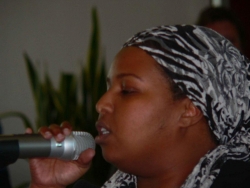 By Miriam Raftery
By Miriam Raftery
April 14, 2010 (Rancho San Diego) – At the “Collaborating for Healthy Communication” conference held April 9 at Cuyamaca College, medical and social service providers heard horror stories of patient care jeopardized by language issues--and potential solutions. The conference was sponsored by the San Diego Refugee Forum, which assists the growing number of refugees in our region from countries around the world.
One woman brought her young son to translate for her at a doctor visit”, a provider who works with local refugees told a large crowd assembled at the event. “The doctor told her to take a suppository, but her son did not feel comfortable telling his mother.” As a result, the woman took the medication orally.
 The Institute of Medicine reported in 1999 that 44,000 people a year die in the U.S. from errors in medication or medical procedures. Among adverse effects from medical errors, 533 were caused by communication errors, said keynote speaker Amy Wilson-Stronks, MPP (photo, right), with The Joint Commission, an organization dedicated to improving healthcare for the public.
The Institute of Medicine reported in 1999 that 44,000 people a year die in the U.S. from errors in medication or medical procedures. Among adverse effects from medical errors, 533 were caused by communication errors, said keynote speaker Amy Wilson-Stronks, MPP (photo, right), with The Joint Commission, an organization dedicated to improving healthcare for the public.
In 2002 the Unequal Treatment Report discussed racial and ethnic disparities in healthcare. That report made recommendations to increase awareness, collect data, change systems and improve communications, including improving health literacy.
“No one who works in healthcare wants to cause any harm,” Wilson-Stronks noted, but added that there are many stages of vulnerability at which potentially dangerous miscommunications can occur.
To lesson those risks, the Joint Commission , which accredits hospitals, has established standards which now state that every patient has a right to receive information, both orally and written, about their care in a way that they can understand. That includes people who have a speech, vision, hearing or cognitive disability. Hospitals must offer translation services , though in how many languages is left up to the hospital to determine based on its patient population.
Providing translators is helpful, but it’s far from foolproof. Error rates among trained interpreters were 50%, according to one study, with the rate even higher (75%) among untrained interpreters. One untrained interpreter mistakenly informed a patient that amoxicillin for an ear infection should be put in the ears.
To improve that situation, Cuyamaca College will soon begin offering a healthcare interpretor certificate program. For information, call (619)660-4350 or visit www.cuyamaca.edu/preview.
The good news is that among hospitals surveyed, all but one do provide some form of interpreters. Nearly all (98%) offer telephone interpreter services, 88% have some bilingual staff, while 38% have a hospital employee as interpreter, 32% use contract interpreters, and 12% rely on volunteers.
But all too often, hospital employees are unaware that translation services exist—and fail to use them. Cultural beliefs may also present barriers to appropriate treatment.
The Joint Commission presented hospital staffers with a hypothetical patient named Juan Lopez, a fictitious 60-year-old Mexican immigrant who reportedly came to an emergency room doubled over in pain. The man, who speaks only Spanish, tells medical workers he believes his neighbor put a curse on him, but he is actually suffering a ruptured appendix and needs surgery.
Asked how they would convey this information to the patient, one E.R. doctor said he would try writing in English or use sign language with photos of a surgeon conducting an operation. Some staffers said of the patient, “He’s crazy.”
Language problems can prove deadly even for those who speak English. Wilson-Stronks told of a widowed doctor, 67, who had a lung biopsy in the E.R., was intubated and sedated, and wound up unable to convey his concerns even though he had expertise in medicine. He wound up with an infection that placed him on life support and ultimately, led to his death. “We advise everyone to speak up and bring a patient advocate,” Wilson-Stronks said. New standards require that a hospital allow a family member, friend or health proxy to be available to be with a patient for the duration of his or her stay.
At least 59 hospital chief executive officers now say that they see a benefit to improving communications, including reducing potential liability and also moving patients through the system faster. In addition, practitioners who can easily communicate with patients may advise on other, less expensive options to receive care other than the emergency room.
For more information, visit www.jointcommission.org/patientsafety/hlc









Comments
One language here, Speak the language where you go.
This is why Everyone should speak English.
It is spoken around the world.
Anyone who can not speak English fluently should be "made" to do so before they can even enter the U.S. or at least before they are released in to the U.S..A society...
I do feel for the ones who do not speak English and had a bad time, and all the rest of the results.
But by the same token I do not feel for them because it IS their fault they are here not being able to speak English...
If I went some where else I feel I would be expected to speak enough of what ever language it is to communicate...
There aren't enough English classes in our area, unfortunately.
There are long waiting lists for them for people from certain countries, with not enough teachers who speak those languages.
Remember that people who came here as refugees are different than other immigrants--they were fleeing homelands under the worst of circumstances, war or persecution. Most haven't had opportunities to learn English even though they want to do so.